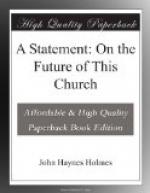Decision on this point came fairly early, and it was favorable to the church. Strangely enough, however, it brought me little peace and surety in my church relations. Outside, in the denomination at large, I found myself in almost constant conflict with my fellows. There were few meetings or conferences in which I did not speak in protest and vote with minorities. Here in the Messiah parish there was no trouble, thanks to your forbearance, friendship, and scrupulous loyalty to freedom; but almost from the beginning there was uncertainty, wonderment, at times unrest, on the part of those longest associated with this society; and the records show a melancholy tale of withdrawals of those, not unable to endure differences of opinion, but impelled to turn away when the institution, long precious in their sight, no longer presented the recognizable attributes of a Unitarian church. That my own shortcomings as a man and a minister were responsible for much of this disturbance inside and outside the parish, I have no doubt. But as I look back over the years, I also have no doubt that there was something much more fundamental here, at the heart of the trouble. That I was a heretic on the social question was insignificant, for Unitarians have long since learned not only to tolerate but to respect their heretics. What was infinitely more important, as I now see, was the fact that unconsciously through these years, I was coming to question not the church itself, as I have explained, but the whole order and purpose of the church as it now exists. Every ecclesiastical institution today is denominational in character. It belongs primarily to some particular sectarian body, and is pledged to the service of this body. Sometimes the central body is narrow, as in the case of the more orthodox Protestant denominations; sometimes it is liberal, as in the case of the Unitarians and Universalists. [11] But always there is a distinctive form of organization, or type of ritual, or doctrine of belief, or spirit of association, which binds these separate churches into a single group; and always this distinctive feature is something which had its origin, and still finds its vitality, in the thought and experience of an earlier age. Every one of our denominations, and every one of the churches in our denominations, is representative of past controversies, not of present interests and duties. No one sect can be distinguished from any other, except by a reference to the text books of Christian history.
Now with the intrusion of the social question into religion, a new concept of church organization came immediately to the fore. The unit of fellowship was now no longer the denomination, but the community. The centre of life and allegiance was no longer the challenge of ancient controversy, but the cry of present day human need. The more I became interested in questions of social change, the less I was concerned with questions of denominational welfare. The




